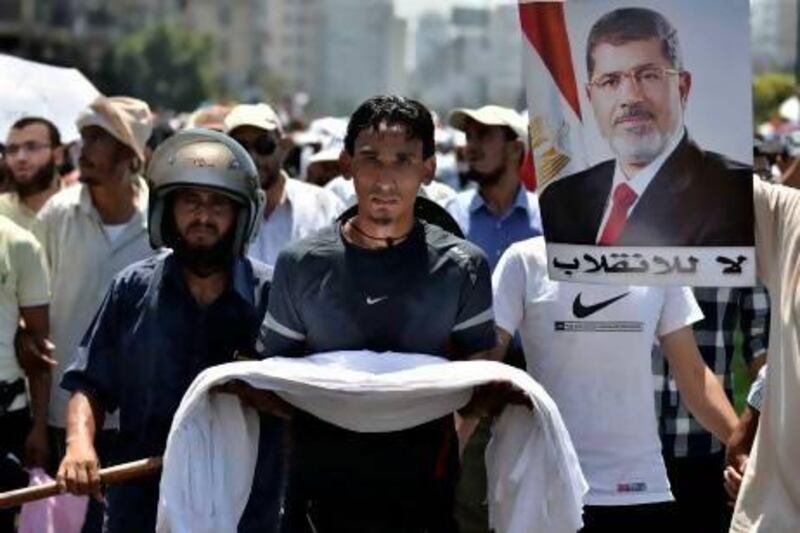CAIRO// Protesters marched through the sweltering streets of the Egyptian capital yesterday calling for the restoration of Mohammed Morsi as president.
An Islamist coalition led by the Muslim Brotherhood had called for a million people to rally in memory of those killed in protests in the month since Mr Morsi was removed, but the turnout in Cairo was perhaps tens of thousands and no large demonstrations were reported elsewhere.
Processions of pro-Morsi demonstrators, some of them led by women, headed to the ministry of defence and to foreign embassies, including that of the United States, whose role in the upheaval has antagonised both sides.
The protesters carried photographs of Mr Morsi, and the Brotherhood said they would continue to demonstrate until he was reinstated.
Yesterday's protests came after the EU foreign policy chief Catherine Ashton became the first foreign official to meet Mr Morsi since he was ousted on July 3. She was flown at night by military helicopter to the undisclosed location where he is being detained.
Baroness Ashton said she and Mr Morsi had a "friendly, open and very frank" conversation over two hours. The venue was not revealed to her and she declined to go into details about the talks, but she said that Mr Morsi was well and had access to television and newspapers.
The protests yesterday avoided any further escalation of violence in which more than 130 demonstrators have been killed in clashes between security forces and crowds of mainly Islamist demonstrators in the past month.
Rallies on Monday night, when people marched with coffins to commemorate more than 82 killed over the weekend, ended with clashes with security forces in the Mansoura and Ismailia areas outside Cairo, though no deaths or serious injuries were reported.
The army had warned demonstrators at the weekend to stay away from military buildings, but the protest heading to the ministry of defence in the afternoon and early evening yesterday was led by women and passed off without violence, though it was blocked from reaching the ministry building.
Other demonstrations were held close to the square at the Rabaa Al Adaweya mosque where thousands of Mr Morsi's supporters have set up camp. There was a heavy police presence around the US embassy, and demonstrators came face to face with soldiers outside Ain Shams University, where they were held off by coils of razor wire. There were also plans for an evening vigil to remember those killed by security forces in recent weeks.
Brotherhood leaders have rejected invitations for talks with the new government, whose appointment was overseen by the military, but hopes of compromise were raised by Baroness Ashton's three-day visit.
It was her second in a month. On July 17 she had asked to meet Mr Morsi but was refused. This time she is thought to have made it a condition for her trip.
There have been hints from Brotherhood leaders that they would be prepared to consider European mediation, but the coalition of Islamist leaders who met Baroness Ashton on Monday said yesterday they had insisted that Mr Morsi be reinstated and the military's actions condemned as a condition for talks.
In a press conference with Mohamed ElBaradei, the Nobel laureate and new vice president, Ms Ashton avoided the word "mediation". She said she had come to talk to the different factions to see a way out of the crisis.
As well as meeting the defence minister and army chief Gen Abdel Fattah El Sisi and interim president Adly Mansour, she spoke to members of the Salafist Nour party, which sided with the army against Mr Morsi, and the rebel Tamarod movement that catalysed huge demonstrations calling for his removal at the end of last month.
"The European Union is not mediating," said Mr ElBaradei. "It is providing ideas to help reach national consensus and move forward."
He said solving the stand-off between the two groups was ultimately the responsibility of Egyptians and he welcomed negotiation with the Brotherhood, but the ideas of international bodies were also welcome.
"There are initiatives for the situation, but most important now is to stop the violence and form independent commissions for investigation," he said. "We need to find a peaceful solution."
twitter: For breaking news from the Gulf, the Middle East and around the globe follow The National World. Follow us





